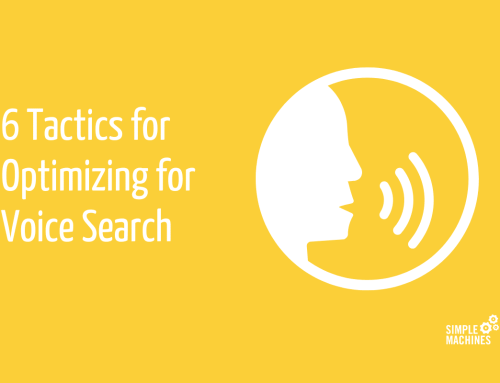Aside from marketing automation and artificial intelligence, the biggest buzzword in marketing this year has been voice search. With the increased adoption of voice-enabled devices like Amazon’s Echo, you might be wondering how this technology might affect your business’s marketing strategy.
Let’s take a look at where voice search currently stands and whether or not your business needs to be making adjustments.
What is it?
As the name implies, voice search refers to online searches done using voice as opposed to typing a query into a search engine.
First widely touted by the introduction of Apple’s Siri on iPhones, voice search has since seen entire devices built around this function like the Amazon Echo and Google Home while still continuing on mobile, albeit in a different fashion (more on this below).
Voice assistants hold a simple appeal — rather than flipping through apps or a browser on a smartphone, users can ask for a restaurant recommendation while driving, lookup the weather or purchase a particular product from their couch without opening a laptop.
Of course, it’s worth noting that voice search is constantly changing and will continue to do so, not only as people get more comfortable with it, but also as the devices built around voice search continue to evolve.
For example, the first round of Amazon Echo speakers were just that — speakers. But already we’re seeing accompanying screens introduced with the new Echo Show.
It’s probably a safe bet that the next step for these speakers will be more widespread adoption of display screens, and while these may eventually add more heft to voice search, right now these displays are more built for uses like showing recipes while you’re cooking and streaming media.
The Difference Between Mobile and Speaker Search
Now is a good time to discuss the difference between mobile voice search and speaker-based searches. While still employed on mobile devices, recent years have seen a stark split between how we use voice search on smart speakers and on mobile.
As research conducted by Stone Temple Consulting shows, voice functions on mobile devices tend to occur while driving or when hands are full — suggesting that mobile voice is more based around meeting immediate needs like responding to messages or getting directions than researching businesses.

A study conducted by CapTech Consulting, on the other hand, found that the top three uses for smart speakers include:
- Playing music (82%)
- Inquiries/information gathering (42%)
- Shopping (39%)
And those who purchase smart speakers fall under the following demographics:
- Millennial or younger, with 53% of users between the ages of 18-36
- 5% are married and make more than $75,000 per year
Finally, here are some other interesting numbers around voice assistants on both mobile and smart speaker usage worth noting:
- Over 18% of the U.S. population uses a smart speaker at least once a month — eMarketer
- Smart speaker owners on average used their devices 2.79 times per day in 2017, while voice assistants on smartphones were accessed only 0.33 times — voicebot.ai
- It’s estimated that 47.3 million people (almost one in five adults) owns a smart speaker — voicebot.ai
How Does This Affect Businesses?
Based on the statistics above, a clear line should be drawn between voice search on mobile and smart speakers.
Voice search can still undoubtedly be carried out on mobile devices for immediate needs like restaurants to eat at, car repair shops and actionable how-to tips (how do I slice a pepper?), but if your business doesn’t fit into these categories, you likely don’t have to worry about optimizing voice search for mobile.
For B2B or B2C companies with more complicated sales processes, there are two key ways voice search via a smart speaker may affect your business: eCommerce and SEO.
Let’s tackle eCommerce first. Ideally, a smart speaker can make purchases much simpler. In an absolutely perfect scenario, you can tell your Echo to reorder paper towels from Amazon, for example. While useful for simple B2C purchases conducted on mainstream eCommerce sites, this functionality is basically useless for B2B organizations.
Which brings us to voice search optimization. Humans process information differently depending how it’s presented to us. Quickly scanning a company’s homepage to see if they might offer services you might be interested in, for example, is much different from having Alexa read back information about a company. It simply takes longer to listen, as Google noted in a recent blog post, and most people lack the attention span for that.
To combat this, voice search optimization calls for shorter, more concise text explaining your business or services written in an easy-to-understand style. Of course, shorter, more concise copy that is easier to understand should already be at the core of your SEO strategy.
Finally, when people do use voice search, they’re generally going to speak in full sentences, like “Alexa, look up marketing companies near me.” Someone typing in a web browser might instead search for “marketing companies Chicago,” but again, search and AI has already been trending to more conversational searches for the past several years.
Do You Need to Do Anything?
The short answer here is no — with some caveats.
If you deal directly with consumers in service positions (restaurants, auto shops, etc.) or have products listed on a mainstream eCommerce site like Amazon, purchasing and search via voice will obviously affect your business more than others and you should be taking a deeper look into a voice search strategy.
In the case of smart speakers, Amazon and Google allow companies to upload their own “Skills” or “Actions” respectively, which are essentially carefully crafted voice commands that will work only for your company. Think of these as kind of catchphrases that can be associated with behaviors like ordering a product or checking on an order status. But be warned, developing these phrases can take a lot of time and will require their own specific marketing push. You can learn more about building Amazon Skills here or Google Actions here.
A B2B company likely won’t have to worry about this. An IT company won’t face one of their prospects asking Alexa to purchase a new firewall and schedule it for installation, for example. They may have to worry about voice search results, however.
If a prospect were to ask their speaker “Where can I find managed IT security services in Chicago,” Google would respond by providing them with a result that they are extremely sure will meet their needs. When someone searches on a web browser, they receive a list of possible answers to their query that Google is confident in, but they also give users the opportunity to scroll and browse. You can’t do this with smart speakers.
So, Google instead finds the highest quality answer to a user’s query and passes that on. This is based off of your website’s domain authority, which includes where you rank for essential keywords and how knowledgeable your organization is believed to be. If you don’t rank at the absolute top of their query, your company’s information won’t be passed on.
Again, though, in a B2B setting like this, prospects are more likely to research various businesses, download content offers and look over testimonials before making any decisions. While being the first name their smart speaker comes up with might add some extra authority, it likely won’t close the door on your chances entirely.
That’s not to say that you should ignore voice search. As previously mentioned, most of what makes an organization stand out in voice search directly corresponds to already established SEO best practices.
You can learn how to optimize content for mobile devices here, find tips for improving your website SEO here and even find best practices for enhancing your Amazon product listings here.
While you don’t have to dramatically change your marketing strategy to accommodate voice search — you should use it to help enhance your efforts.












